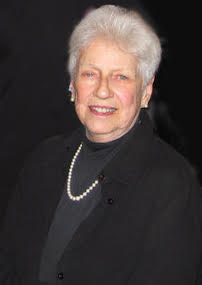Sheila Keats
 Pianist, educator, and administrator Sheila Keats was a pillar of support for Louise Behrend, The School for Strings Founder, and for the School’s community at large. She possessed an uncommonly sharp mind, a penchant for self-reliance and, in her administrative work, unfailing precision.
Pianist, educator, and administrator Sheila Keats was a pillar of support for Louise Behrend, The School for Strings Founder, and for the School’s community at large. She possessed an uncommonly sharp mind, a penchant for self-reliance and, in her administrative work, unfailing precision.
Miss Keats began her higher education at Radcliffe College in 1947, and went on to graduate from The Juilliard School in 1954. After graduating, she stayed on at Juilliard in an administrative capacity as the Managing Editor of the Juilliard Review and Director of Alumni affairs. During the 1960’s and early 70’s Miss Keats was a sought after administrator among many leading New York City arts institutions, as a manager and press representative for the Goldman Band and as a program annotator for Lincoln Center, the American Symphony Orchestra, Carnegie Hall, Avery Fisher Hall, and Town Hall.
Sheila Keats initially joined The School for Strings at Miss Behrend’s request. At that time, SFS was known simply as The Suzuki Program. Having outgrown Miss Behrend’s living room and now occupying space at the Church of the Heavenly Rest on Fifth Avenue, the informal program needed its first administrator. Miss Keats, Louise Behrend’s piano collaborator at Juilliard, agreed to step in and thus began an incredibly productive relationship that culminated in the creation of one of the best music programs for children in the country.
Years of collaborative work between Miss Keats and Miss Behrens produced the blueprint for what is now The School for Strings. Under Miss Behrend’s tutelage, Miss Keats began to teach Suzuki piano and Suzuki piano pedagogy. Her seedling studio eventually blossomed into The School for Strings’ current piano department of almost ninety students and a roster of teacher training graduates dozens long. Miss Keats and Miss Behrend were united in their vision of music education. They enthusiastically endorsed Dr. Suzuki’s unparalleled approa is ch to the teaching of very young children. Both ladies were emphatic that the success of Suzuki education was singularly dependent on the quality of work done at home by the parent, supported by a home environment that incorporate music education. Both ladies departed from Dr. Suzuki’s philosophy by holding music above all. They also believed that his approach could be taken to new heights when framed by professional-style instruction. The combination of their educational precepts and superior teaching turned The School for Strings into a special place, earning it the highest of regards both at home in New York City and nationally. Miss Keats’ influence as an educator continued to be felt beyond The School for Strings, in particular as a staff pianist at The Juilliard School from 1972-2008 and as a visiting professor at the Universidad Internacional Menendez Pelayo, in Santander, Spain in 1990.
In her own work with children, Miss Keats showed the old-fashioned touch. She loved and nurtured students while being an “iron lady” and a self-described “maverick.” Standards were “unshakable” and applied equally to every student and parent, regardless of innate ability or family circumstances. Standards were “impersonal” because she believed that, in the end, it was music that demanded them. The recollections of Leon Lai, then age six, speak volumes about Miss Keats’ pedagogical prowess and the depth of her vision: “I remember my first impression of her as strict and unforgiving, making me redo the whole first Suzuki Book, scrutinizing my technique and constantly reminding me of “down-ups” and to “quack.” The first year was miserable, as she made me cry quite a few times through painstakingly-slow lessons. However, with the more time I spent with her I realized that her endless drills and scales were to make me the best pianist I could be and that all the compliments I received during recitals and group classes were because of her. Quickly, the once depressing lessons turned into times of joy, and many occasions ended with us cracking up in laughter.”
Miss Keats was born on December 7, 1929 in Bayonne, New Jersey, the daughter of Irving and Helen Keats (née Saskin). She lived most of her adult life in New York City. The passing of Sheila Keats, in March 2016, closed an important chapter in the history of The School for Strings. In the end, The School for Strings became Miss Keats’ life and the School’s families, her children. She is greatly missed by our community.
